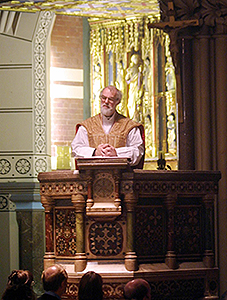![]() Pojutrze Kościoły protestanckie obchodzą Dzień Reformacji. Również i my upamiętniamy na blogu to przełomowe wydarzenie w historii zachodniego Kościoła, które na dobre zmieniło również oblicze Kościoła Anglii, a co za tym idzie walnie przyczyniło się do narodzin anglikanizmu jako odrębnej tradycji w łonie chrześcijaństwa. W tym roku czynimy to słowami poprzedniego Arcybiskupa Canterbury, Rowana Williamsa, które zaczerpnęliśmy z jego książki
The Wound of Knowledge
.
Pojutrze Kościoły protestanckie obchodzą Dzień Reformacji. Również i my upamiętniamy na blogu to przełomowe wydarzenie w historii zachodniego Kościoła, które na dobre zmieniło również oblicze Kościoła Anglii, a co za tym idzie walnie przyczyniło się do narodzin anglikanizmu jako odrębnej tradycji w łonie chrześcijaństwa. W tym roku czynimy to słowami poprzedniego Arcybiskupa Canterbury, Rowana Williamsa, które zaczerpnęliśmy z jego książki
The Wound of Knowledge
.
Reformacja postawiła pytanie ogromnej wagi dla wszystkich chrześcijan, pytanie o to, na ile ciągła i od czego zależna jest ludzka odpowiedź Bogu. Uznała, że Kościół może błądzić, że żaden stopień scholastycznej precyzji nie zagwarantuje wierności Bogu, że w Kościele nie ma pewnego miejsca o niekwestionowanym autorytecie. Wymownie wskazała na ludzką ułomność (brokeness), porażkę rozumu i porządku. Ale uczyniła to jedynie po to, aby triumfalnie stwierdzić, że pewność Kościoła znajduje się właśnie w jego porażce, braku bezpieczeństwa i wykorzenieniu, które zawsze prowadzą go z powrotem do źródła znajdującego się w Słowie, które stało się ułomnym ciałem (broken body). Samowystarczalności chrześcijaństwa przeciwstawia się – słusznie i zdecydowanie – krzyż. Chrześcijanom szkającym znaku, pewności, ofiaruje się jedynie “znak Syna Człowieczego”, Boga ukrytego w śmierci Chrystusa… Luter przypomina zarówno katolikom jak i protestantom, że siłą chrześcijaństwa jest jego odmowa odwrócenia się od zasadniczej i trudnej prawdy o ludzkiej samodestrukcji, że to własnie tam, w miejscach najbardziej gorzkiego wyobcowania, można wyczuć głębię i zakres zwycięstwa Chrystusa i że tam może się narodzić tajemnicza radość, która przemienia wszelkie doświadczenie – to ukryte, ale przenikające wszystko wyzwolenie. (str. 160-161)
![]() In two days the Protestant Churches will celebrate Reformation Day. We too would like to commemorate this ground breaking event in the history of the Western church, which has also changed the face of the Church of England, and, what follows, has greatly contributed to the birth of Anglicanism as a separate tradition within Christianity. This year we do it quoting the former
In two days the Protestant Churches will celebrate Reformation Day. We too would like to commemorate this ground breaking event in the history of the Western church, which has also changed the face of the Church of England, and, what follows, has greatly contributed to the birth of Anglicanism as a separate tradition within Christianity. This year we do it quoting the former
 Archbishop of Canterbury, Dr. Rowan Williams, from his book
The Wound of Knowlegde
.
Archbishop of Canterbury, Dr. Rowan Williams, from his book
The Wound of Knowlegde
.
The Reformation put a question of the utmost gravity to all Christians, a question about the continuity and dependability of human response to God. It affirmed that the Church was capable of error; that no amount of scholastic tidiness could guarantee fidelity to God; that there was in the Church no secure locus of unquestionable authority. It pointed eloquently to human brokenness, the failure of reason and order. But it did so only to claim triumphantly that the Church’s security lay in this very failure, in the insecurity and un-rootedness which drove it always back to its spring in the Word made broken flesh. Against the self-sufficiency of Christendom is set – rightly and decisively – the cross. To Christians looking for a sign, an assurance, it offered only the ‘sign of the Son of Man’, God hidden in the death of Christ… Luther is a reminder to Catholic and Protestant alike that the strength of Christianity is its refusal to turn away from the central and unpalatable facts of human self-destructiveness; that it is there, in the bitterest places of alienation, that the depth and scope of Christ’s victory can be tasted, and the secret joy which transforms all experience from within can come to birth, the hidden but all-pervading liberation.” (p. 160-61)




